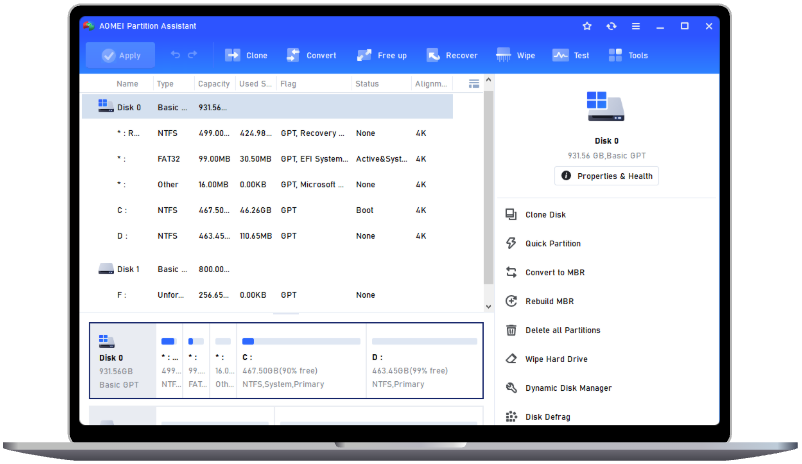[Explained] Does BitLocker Slow Down SSD?
Does BitLocker slow down SSD? Yes, BitLocker can slow down an SSD. But don’t worry, in this post, you can also find different methods to fix this tricky issue so that you can make your SSD run faster.
Does BitLocker slow down SSD?
BitLocker, a built-in encryption feature in Windows, is designed to protect your data by encrypting your entire drive. But one common question among users is whether BitLocker slows down an SSD (Solid-State Drive). The short answer is yes, but the impact is generally minimal, especially on modern SSDs.
BitLocker uses advanced encryption algorithms (like AES) to secure your data. This means that whenever you read or write data to your SSD, BitLocker must encrypt or decrypt it in real-time. While this process can affect performance, the impact depends on several factors:
◆ SSD speed: High-end SSDs with fast read/write speeds can handle the encryption/decryption process with minimal slowdown.
◆ CPU performance: A strong CPU can efficiently manage BitLocker’s encryption, reducing the impact on system speed.
◆ Encryption mode: BitLocker offers two modes—Software-based and Hardware-based (via TPM). Hardware encryption is faster because it offloads the process to the drive’s built-in encryption controller.
How to solve BitLocker slowing down SSD
To enhance SSD read and write performance, consider disabling BitLocker or switching to hardware-based encryption.
Fix 1. Check BitLocker encryption state
Begin by confirming the current state of BitLocker on your SSD:
Step 1. Press the Windows key, type cmd, and right-click Command Prompt to select Run as administrator.
Step 2. Enter manage-bde -status and press Enter. This will open the BitLocker Drive Encryption: Configuration Tool.
Step 3. Review the "Conversion Status" and "Encryption Method" sections for each volume:
• If "Conversion Status" shows Fully Decrypted, BitLocker is disabled.
• If "Encryption Method" displays XTS-AES, software-based BitLocker encryption is active.
• If "Encryption Method" indicates Hardware Encryption, it means BitLocker is using hardware encryption (OPAL).
Fix 2. Disable or turn off BitLocker encryption
If your SSD relies on software-based encryption, you can either turn it off or switch to hardware-based encryption for better performance.
Step 1. Open the Start menu, type Control Panel, and select it.
Step 2. Go to System and Security > BitLocker Drive Encryption.
Step 3. Locate the target drive and choose Turn off BitLocker to disable software-based encryption.
Fix 3. Check SSD performance and improve SSD speed
If you've noticed your SSD slowing down due to BitLocker encryption, you're not alone. BitLocker is an excellent security feature, but it can sometimes reduce your SSD’s speed. Fortunately, AOMEI Partition Assistant provides a reliable solution for this issue.
AOMEI Partition Assistant is a versatile disk management tool designed to help you manage, optimize, and maintain your storage devices. It comes with a range of features that can boost your SSD's performance, even when BitLocker is enabled.
With its "Disk Speed Test" feature, you can quickly test your SSD's read and write speeds, identifying any performance issues. Additionally, it also enables you to run SSD 4K alignment to make sure your SSD is running at peak efficiency.
Whether you're struggling with a slow SSD due to BitLocker encryption or just want to ensure your SSD is performing at its best, AOMEI Partition Assistant is your go-to solution.
1. Disk Speed Test
Step 1. Install and run AOMEI Partition Assistant. Click "Test" and select "Disk Speed Test".
Step 2. The Simple Mode is selected by default, you can click "Start" to begin testing.
Step 3. Or you can click "Pro Mode" to test the hard drive in a comprehensive way.
Step 4. In the new window, you can change the default settings as you wish: to-be-tested Partition, Average/Maximum speed, Size, Test Number, and Duration. After everything is set, click "Start" to begin testing the hard drive read and write speed.
Step 5. When the test is done, you can see the result directly on the interface, and you can also choose to export the result to analyze later.
2. Partition Alignment
Step 1. Install and run AOMEI Partition Assistant. Right-click the partition you want to align and select Advanced > Partition Alignment.
Step 2. In the pop-up window, select 4096 sectors from the given list and click OK.
Step 3. Click Apply > Proceed to execute the operation.
Conclusion
While BitLocker may slightly slow down SSDs due to real-time encryption and decryption, the impact is minimal on modern, high-performance SSDs. Factors like SSD speed, CPU power, and encryption mode (software or hardware-based) influence the degree of slowdown.
To maintain optimal SSD performance, you can switch to hardware-based encryption or disable BitLocker. For a more comprehensive solution, use AOMEI Partition Assistant, which offers features like "Disk Speed Test" and "SSD 4K alignment" to enhance your SSD’s speed and efficiency, even when BitLocker is active.


